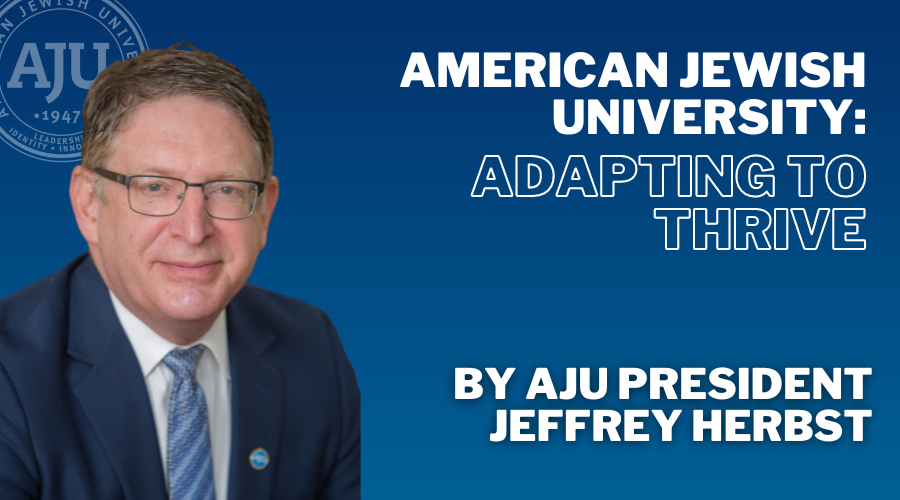
The Jewish world is changing quickly. Today, young Jews exhibit greater diversity, are less bound by traditional denominational affiliations, and embrace a wide range of personal practices and interpretations of what it means to be Jewish. To not only endure but flourish, Jewish institutions must adapt fundamentally to engage with Jews wherever they may be, both geographically and spiritually.
This week, American Jewish University completed the sale of its Sunny & Isadore Familian Campus in Bel Air to the Milken Community School – a move that positions us to be a local and national leader for this new Jewish world. We have offloaded the enormous fixed costs of operating a facility—including skyrocketing sums for insurance, security, and utilities—to focus our resources on programs that can most effectively serve the Jewish community now and in the future.
The proceeds of the sale allow us to strengthen and expand programs that demonstrate extraordinary growth at a time when so much of the Jewish discussion is focused on decline and retrenchment. For instance, our Miller Introduction to Judaism Program offers one of the most popular paths to conversion in the world and shares Jewish knowledge with Jews and non-Jews alike. By making the program largely online, we will be able to reach 900 people this year – nearly three times the amount served before the pandemic. The same course is taught in person at dozens of locations across the country and, increasingly, around the world.
Similarly, a few years ago, we recognized a great need to train more high-quality early childhood Jewish education teachers. These educators are not only critical for supporting the development of healthy and Jewishly connected children but, as the Federation’s study of Jewish Los Angeles noted, the schools they teach in are also often the gateways for young families to join synagogues and become involved in Jewish life. In the last few years, we have built a suite of fully online certificate and degree programs at the bachelor’s, master’s, and doctoral levels that now serve 100 students, who are often concurrently serving as Jewish education administrators and teachers, across the country. Within three years, we are projecting to reach 175 students – and the School is expected to continue growing from there.
Finally, we continue to reinvent adult education for those hungry to learn more about Judaism. In the last four years, we have had more than 150,000 registrations for our online programs. We are also bringing in-person education to Jews across the city rather than expecting people to travel to Bel Air—a location that can be inconvenient for many Los Angelenos. Recently, we hosted a program with Rabbi Sharon Brous in Hancock Park. We will soon have a program with feminist Letty Cottin Pogrebin at the Los Angeles LGBT Center talking about her book Shanda and one with Rabbi Shai Held discussing his new book, Judaism is about Love in another LA neighborhood.
AJU’s programs are not going exclusively online. We are retaining the 2,700-acre Brandeis Bardin Campus in Simi Valley that houses our much-beloved. Camp Alonim, the distinguished Ziering Brandeis Camp Institute (BCI), and a conference center. In addition, the Ziegler School of Rabbinic Studies will soon complete its move to its new home at 350 S. Beverly (at the corner of Olympic), enabling in-person training of future Jewish leaders in the heart of Jewish Los Angeles. This new location will also enable AJU to provide in-person adult education in a convenient setting. Finally, AJU will continue to operate the Community Mikvah on the Familian Campus, which provides all Jews with a critical ritual and spiritual space.
The investor Ray Dalio famously said, “Evolve or die. This evolutionary cycle is not just for people but for countries, companies, economies—for everything.” That attitude is common in business, where companies move, split up, and merge on a regular basis. However, there is often an expectation in the non-profit, education, and Jewish worlds that institutions created one way will remain the same forever. The world has not ever favored that kind of stasis. The 21st century, given seismic changes in technology and demography, will be particularly punishing to those who do not adapt.
AJU is not resisting the winds of change but embracing the new world. The sale of our Bel Air campus will allow us to serve the Jewish community of today and, critically, the Jewish communities of future generations. Given all the heartache and sadness in the world today, that is a cause for celebration.
Jeffrey Herbst is President of American Jewish University.
Contact Communications
Michelle Starkman, M.A., MBA
Vice President, Communications
michelle.starkman aju.edu
aju.edu
(310) 440-1526
